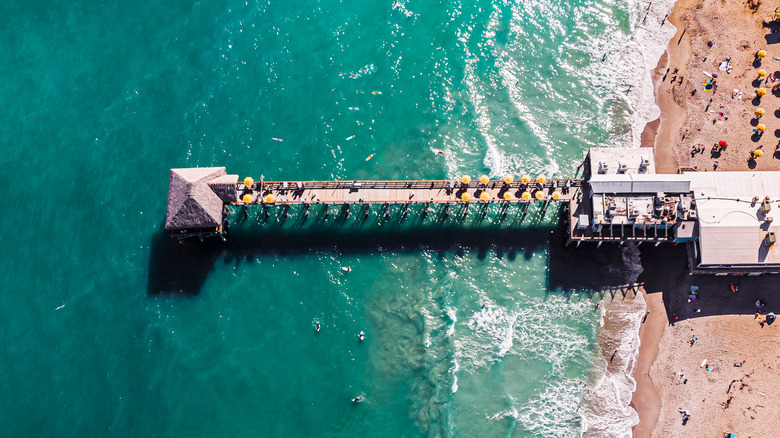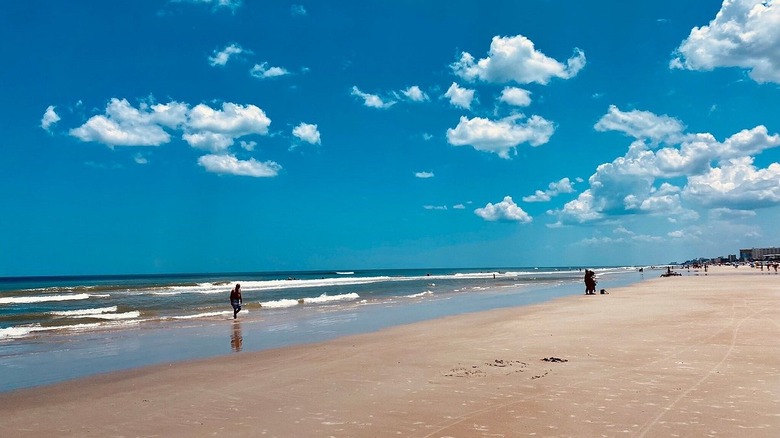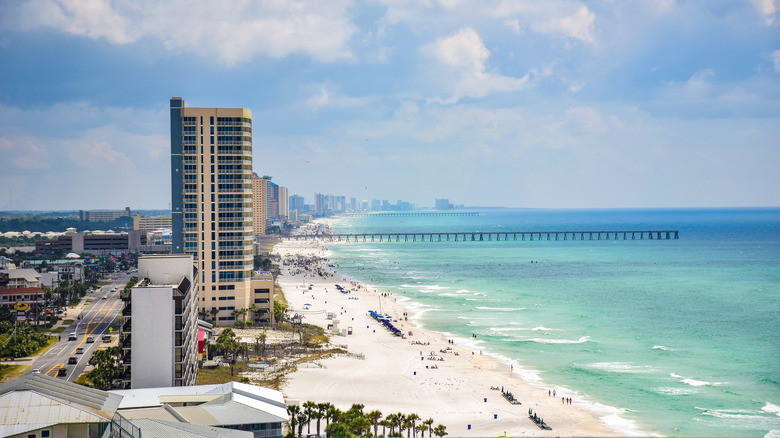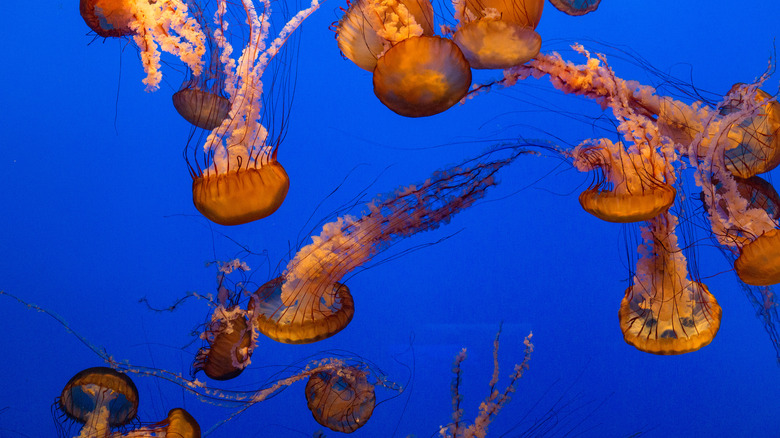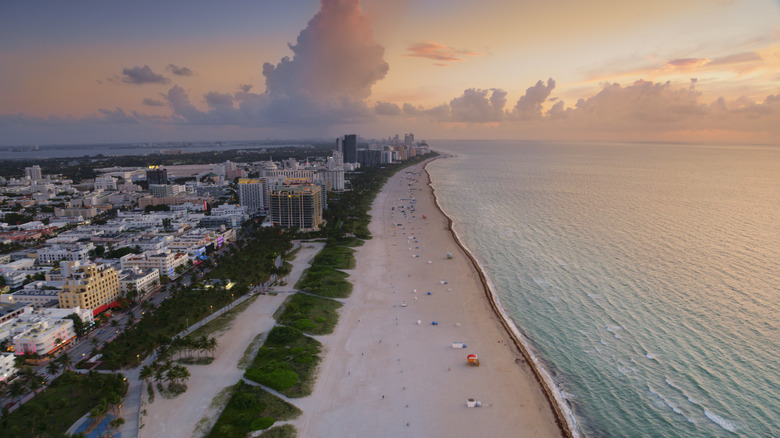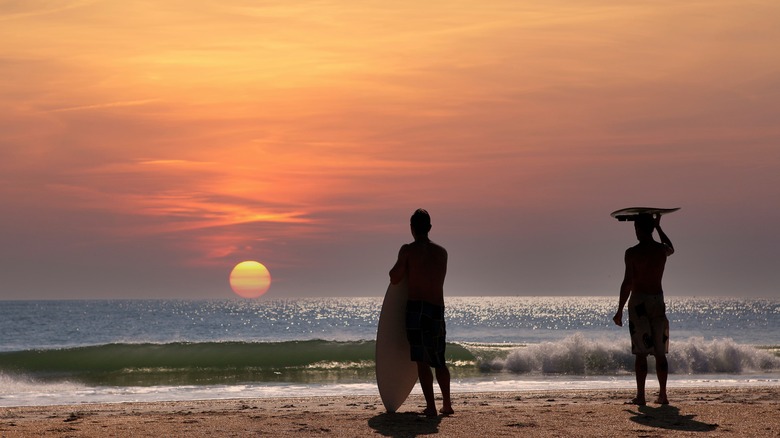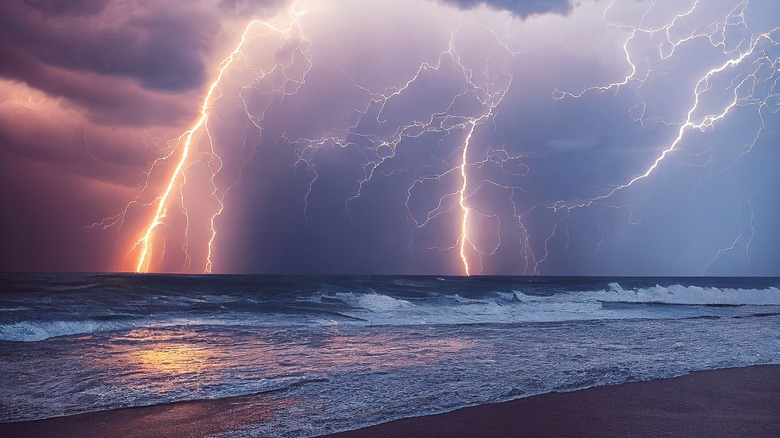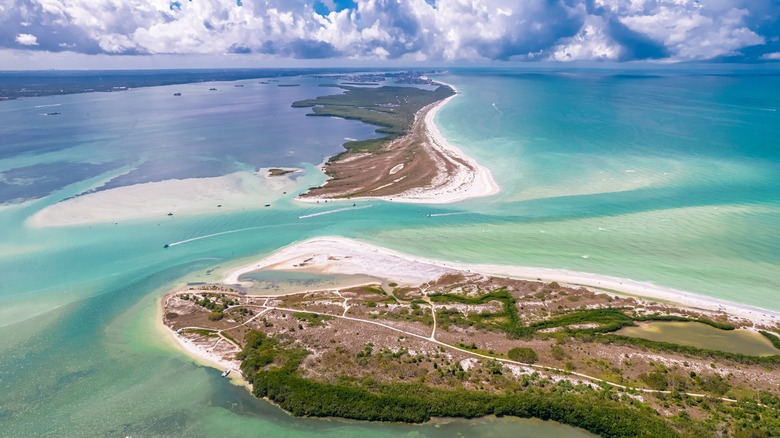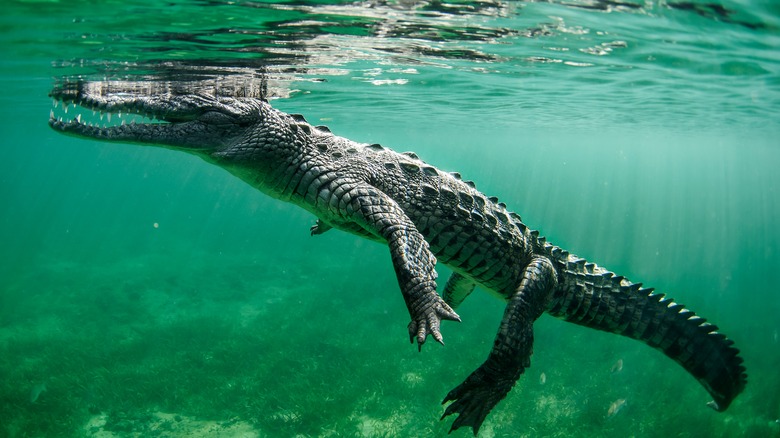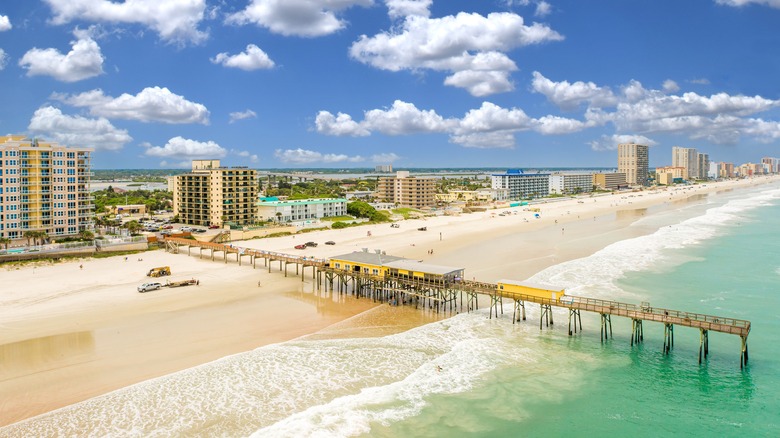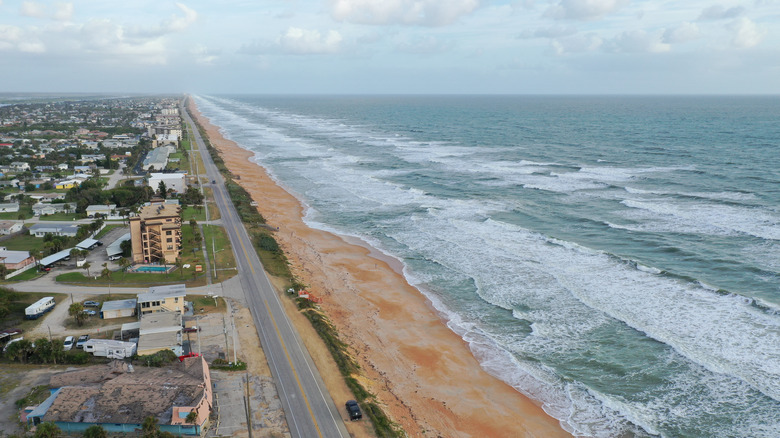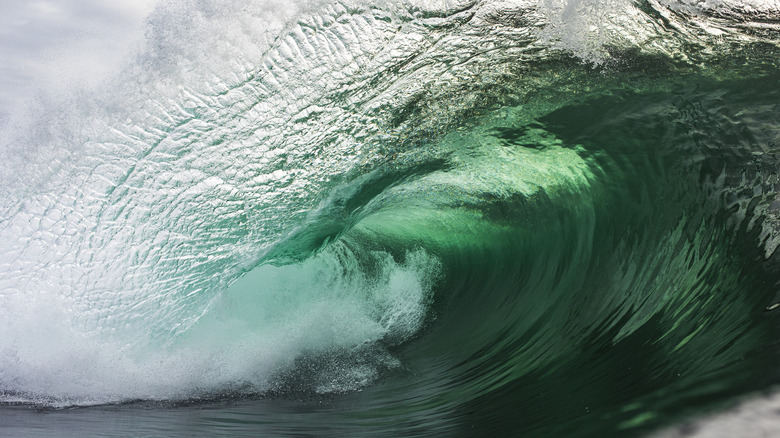Research Says You Should Skip These Dangerous Beaches When Visiting Florida
Florida is one of the most popular once-in-a-lifetime vacation destinations in the United States, thanks to its eternally warm weather and abundance of picturesque beaches. Every year, millions of tourists make their way down south to put their vacation time to good use in Florida, soaking up the intoxicating beach lifestyle. While Florida's beaches have placed the state on the map and made it a favorite place to visit all year round, many of these shorelines are infamous for being extremely dangerous. Scarily, some of the most popular beaches in Florida are also the most lethal.
A 2023 study by Travel Lens found that 70% of America's deadliest beaches are in Florida. That's a lot of room for risk, especially for visitors who aren't well-versed on which beaches can be questionable. The most worrisome part is that there isn't just one risk factor to think about at Florida beaches. There is a whole roaster of items that can hurt or even kill you, from painfully strong rip currents to hungry sharks.
That's why it's crucial to know which beaches in Florida are dangerous and what makes them so before diving into the water. To help you with this task, the Islands team conducted thorough research into recent and historical incidents at beaches across Florida to determine which ones are life threatening. On your next trip to the south, skip these dangerous beaches when visiting Florida.
New Smyrna Beach
This beach is informally known as "the Shark Bite Capital of the World." That should be enough to make you think twice about visiting New Smyrna Beach on the East Coast of Florida. The bone-chilling honor was bestowed upon the beach by the media after being the site of several shark attacks yearly.
According to the International Shark Attack File at the Florida Museum, Florida as a whole has more shark bite incidents than anywhere else in the world, with a total of 259 incidents from 2012 to 2021. That accounts for 34% of the entire world's total during that decade-long period. While that's terrifying in itself, it's even more alarming that most of these Florida shark attacks occur around the New Smyrna Beach area. Half of the state's shark attacks in 2023 took place in the Volusia County coast, where New Smyrna Beach is located.
That same year, in an interview with Today, a surfer named Mark Summerset described getting bitten in the face by a shark at New Smyrna Beach. "It felt like a bear trap ... sharks have five rows of teeth, so he tore me up pretty bad, and he let go." Later in the year, a 13-year-old girl was bit in the foot while boogie-boarding, and a month after, two different people were attacked on New Smyrna Beach in just two days. When waters are this dangerous and shark-infested, you might as well steer clear of this beach in Florida.
Panama City Beach
Unfortunately, death is a common occurrence at Panama City Beach. It is considered the deadliest beach in the United States as of 2023 because, out of all the beaches in the country, it had the most fatalities. In the summer of 2023, seven people were killed at Panama City Beach over the course of just nine days. Interestingly, three of them died on the same weekend.
The culprit making this Florida beach so particularly dangerous for its visitors is its rip currents. Speaking to Nexstar Media Inc., Ross Whitley, the Chief Meteorologist at News 13, explained rip currents as "fast, narrow moving channels of water that will pull you out away from the shore ... That means no matter how well you swim you can be caught off guard by a rip." These currents can move you through the water twice as fast as an Olympic swimmer, so in the blink of an eye, you can be football fields away from the shoreline.
While rip currents can be survived with the proper protocol, many inexperienced tourists panic when they realize they're straying further from land and end up drowning because they tire themselves out. Whitley's advice for conquering rip currents is to stay calm, float facing the shore to your best effort, and wave your hands for help. Alternatively, just stay out of waters teeming with rip currents.
Palm Beach
There are so many organisms in the ocean that can hurt you, and one discharging such painful experiences is the jellyfish. The possibility of getting stung by one of these guys is incredibly high on Palm Beach, Florida, because they flock to the area in droves. Palm Beach has such a large population of stinging jellyfish that humans come into contact with them on a near-daily basis during the high season.
In 2022, lifeguards at Palm Beach said they treat up to 30 people every day for jellyfish stings. It can be difficult to spot a jellyfish in the water; their tentacles can be up to 121 feet long, so it's easy to accidentally bump into one, and it's not a pleasant experience. In r/scuba, one Redditor said that when they were stung on the forehead, the pain was so excruciating that they could barely see and thought they might even be having a stroke in the water before realizing it was actually a jellyfish.
The Portuguese man-of-war jellyfish species are especially common on Palm Beach. They emit a very nasty sting, and they are quite difficult to see in the water because their umbrella-shaped bell colors match the hue of the ocean. Many lifeguards at Palm Beach carry sting remedies during their shifts, like vinegar and cold packs, for the man-of-war stings they know they'll eventually have to treat.
Miami Beach
Miami Beach isn't dangerous due to its overpowering seas or large population of marine life. This iconic Florida beach is rather sketchy because there is a high crime rate in the area. Miami Beach and some of its surrounding cities were ranked by FBI data as some of the most dangerous places in Florida because for every 100,000 people here, 1,000 crimes are committed. All that energy culminates down the shoreline.
Violent crimes often peak when tourists flock to Miami Beach in the high season, around spring break; visitors are advised to be especially cautious during this popular time of year. As Miami Beach hotel owner Mitch Novick confirmed to 7News Miami, "It's disruptive. Spring break has always been disruptive." In 2023, there were two fatal shootings over the spring break period alone, and the crowds got so huge that it was basically impossible to control, even with lots of police around.
The area is still pretty dangerous during the low season when there aren't as many tourists there. In February 2024, a 14-year-old was shot after a fight on the Miami Beach boardwalk. In some ways, the fact that the danger of Miami Beach isn't nature or animals but rather humans makes it even more unsettling. Stay aware of your surroundings if you decide to spend your vacation at this popular beach in Florida.
Cocoa Beach
The thought of being dragged below the surface by a shark when swimming around in the ocean can be scary. But that might be the last thing on your mind when trying to spot dolphins from the shore on your beach vacation. Unfortunately, this horrifying scenario is a real possibility when swimming at Florida's Cocoa Beach. EssentiallySports notes that Cocoa Beach had the second-highest rate of shark attack incidents in 2023 (7.57 out of 10) in Florida after New Smyrna Beach.
In 2023, 12-year-old Magnolia Woodhead had a vicious encounter with one of these sea creatures when swimming at Cocoa Beach. Everything was going fine that day, but then, out of the blue, she felt razor-sharp shark teeth sink into her leg, which is just about every beach-goer's worst nightmare. Luckily, Magnolia's story had a happy ending, and she survived, but needed 50 stitches after enduring 3 shark bites.
Besides the sharks, the rough waters at this Florida Beach can also be deadly. Around a decade ago, a 66-year-old man drowned at Cocoa Beach after being pulled away from the shore by powerful currents. Then, in 2023, a surfer died in the merciless waters at this Florida Beach, and a year earlier, a 17-year-old girl was killed in the same way. All in all, the risks of visiting Cocoa Beach far outweigh the benefits.
Siesta Beach
The danger lingering along the shores of Siesta Beach is something you wouldn't expect. It's not sharks or strong tides — in fact, it doesn't even come from the ocean at all — it's lightning. While it seems like an unlikely culprit, people have been getting struck or even killed by lightning on this Florida Beach for decades.
It's practically become a horrific tradition. As far back as 1991, two people were killed by a lightning strike to the head on Siesta Key. When the bolt hit the area, the force was so strong that it knocked several other people to the ground. One survivor recounted the experience to the Tampa Bay Times: "All of sudden, there was a big boom and you just felt your hair stand on end. It knocked all of us down."
Lethal lightning strikes haven't stopped in recent years, either. In 2018, a 33-year-old man on Siesta Beach became the 501st person in Florida to get struck and killed by lightning (via The Florida Times-Union). Only a couple of years later, in 2020, a teenager was critically injured and left without a pulse after being struck by lightning on this beach in Florida. Miraculously, he survived, but he is still in the process of recovery.
Honeymoon Island State Park
Honeymoon Island State Park sounds like a cozy romantic getaway to a forested lodge, where you can forget about your worries and lounge the afternoon away in beautiful Florida. However, visitors to the beaches around Honeymoon Island will have a whole new set of threats to worry about that can actually kill them. To start, the waters around the beaches make it one of the world's most dangerous islands.
The seas surrounding this Floridian state park have powerful currents that can easily pull inexperienced and careless swimmers from the shore. The other big concern about swimming around Honeymoon Island is that the depth of water can change without warning due to sand migration and erosion. It's become so hazardous that the Florida State Parks Association instructs visitors not to go into the water as of April 9, 2024.
That's not the only potential danger lying in wait around Honeymoon Island State Park. Former visitors say that the beach becomes infested with stingrays from Memorial Day to Labor Day. One Tripadvisor user who went to Honeymoon Island's beach in late May explained, "Within 2 minutes of getting in the water, my husband was stung by a stingray. We were stumbling over rocks trying to get out to sandy water and I guess that is where they like to hang out." These animals will not hesitate to give swimmers a brutal sting, which can become deadly if the person has an allergic reaction.
Satellite Beach
Florida is a host to tons of terrifying animals, and Satellite Beach is a hotbed for several deadly species. Firstly, one of the state's most infamous beasts, the crocodile, roams freely around the area. In 2023, the Satellite Beach community became painfully aware of the possible dangers of Florida's crocodiles when one of them killed a local pet dog. Sightings of crocodiles around Satellite Beach are fairly common, but the residents were not prepared to see a tiny pug hanging out of one of their mouths.
Secondly, there are bite-happy sharks swimming in the waters of Satellite Beach. In 2019, a young boy was surfing here when he felt something grab onto his foot. Speaking to Florida Today, the 13-year-old boy recounts: "I was coming in and he bit my foot and then bit it again." He ended up with 19 stitches after this horrifying shark encounter.
A few years later, in 2023, another surfer named Bill Eveland was attacked by a shark on this Florida beach. This time, the victim got caught up in a feeding frenzy, and he had to get 25 stitches in his lower back. With all these predators inhabiting Satellite Beach, it might just be a better idea to avoid it entirely.
Daytona Beach
Daytona Beach is one of the most-visited coastal hotspots in Florida — 10 million people visit to enjoy the area every year. Unfortunately, many of these tourists don't realize how dangerous Daytona Beach can be when they book a vacation and get in the water. That single oversight costs many visitors their lives because they aren't aware of the rip currents at Daytona Beach.
Tourists must be cautious and keep in mind that rip currents are a huge problem around this area of central Florida. Inexperienced swimmers are often swept out into the open ocean by these currents, and they start to panic, often drowning, when they realize how far they've been dragged from safety. In the summer of 2023, three people were pulled out by a rip current at Daytona Beach and had to be rescued by professionals. All of them were rushed to the hospital, but sadly, one died from the incident.
Approximately a month later, another man from Cleveland got sucked into a rip current and drowned after being unable to escape from its grasp. Anyone who decides to get in the water at Daytona Beach should keep in mind that the best way to escape a rip current is by angling your body sideways to the shore and swimming that way until you get out. If you're unsure of how to achieve this, we recommend not getting into the water at all.
Ormond Beach
Ormond Beach has developed a reputation for being one of the deadliest beaches in the United States. Many of the varied hazards that pop up at beaches around Florida all accumulate at Ormond, which makes it a particularly dangerous location to go swimming. The first thing to know is that Ormond Beach gets brutal rip currents.
Just a couple of years ago, in 2022, a man who was vacationing around the area with his wife drowned in a rip current at this beach. It was believed that the waves were so strong that he might have suffered an injury in the water, hindering him from swimming. Just two years before, the same thing happened to a 7-year-old child who also succumbed to the same fate.
Another reason to possibly skip Ormond Beach when you go to Florida is because it has a long track record of shark attacks. There have been around 16 recorded shark attacks on Ormond Beach over the past few decades. One of the most recent incidents occurred in 2017 when a teenager had his hand bitten by a shark, but he only suffered from treatable injuries.
Methodology
The Islands team developed this ranking of the most dangerous beaches in Florida through an intricate research process. First, we reviewed several lists of notoriously deadly beaches throughout the state. Then, we narrowed our findings by looking into recent and historical incidents at each location and identified the risk factors that made them threatening to beach relaxation and human life. We achieved this by combing official statistical data and news articles about specific events at each beach.
Finally, we determined which beaches posed the maximum risk level to visitors based on the severity of incidents and the frequency of occurrences at each site. We also researched potential precautions visitors could take to diminish their chances of encountering a problem on these dangerous Florida beaches. Finally, we presented our top 10 most dangerous Florida beaches, organized in no particular order.
